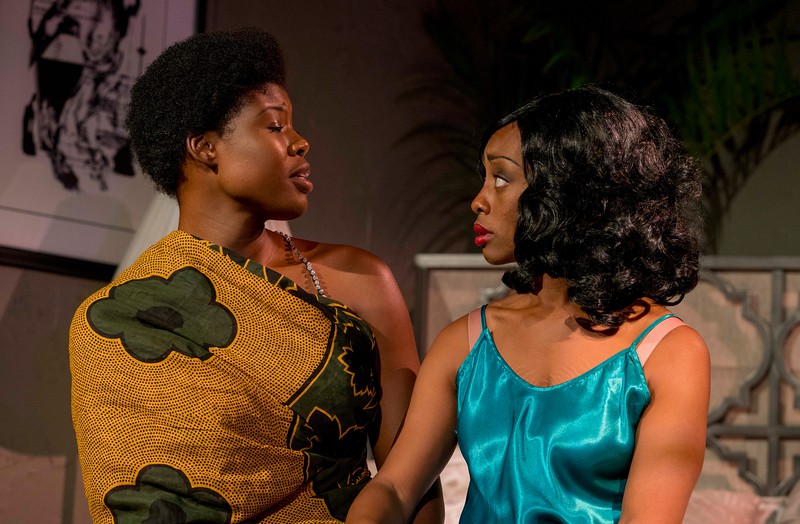|
Joy Yvonne Jones (left) and Cashae Monya in "Voyeurs de Venus." Photo courtesy of Moxie Theatre The story of Saartjie Baartman is horrific. A Khoikhoi woman who lived in southwestern Africa around the turn of the 19th century, she would leave her native country upon a British trafficker’s promise of making money for a better life, only to become a victim of exploitation, degradation and all manners of abuse. She would be turned into a sideshow humiliation: the “Hottentot Venus.” Baartman’s body, in particular her backside, were sexualized for the titillation and gawking of white Europeans. Even after her premature death, Baartman’s body would be victimized, turned into another kind of exhibition that demeaned her physicality and her soul.
Fittingly, Lydia R. Diamond’s 2006 “Voyeurs de Venus,” which launches Moxie Theatre’s 14th season, opens with a nightmare: not one to torment Baartman, who must have endured many, but young Sara Washington, who awakens terrified. For the 21st-century cultural anthropologist (Cashae Monya), this is a premonition, dramatized onstage like all of her bad dreams to come in a feverish dance sequence choreographed by Michael Mizerany. “Voyeurs de Venus” reunites three principals from Moxie’s powerful production of “The Bluest Eye” five years ago. Diamond wrote the stage adaptation of Toni Morrison’s 1970 novel; Moxie co-founder Delicia Turner Sonnenberg directed; and Monya fronted a stellar cast. With “Voyeurs de Venus,” Turner Sonnenberg, Moxie’s former artistic director, has conceived an uncompromising, visceral theater experience that is very much in keeping with the pain and tumult that inhabited Baartman’s tragic life. Diamond’s lengthy play flits back and forth in time, telling Baartman’s story in the early 1800s and that of Sara, an exuberant, scrupulous academic who is offered a lucrative book deal to tell the “Venus Hottentot” story in an “entertaining” fashion. Her anguish and (though she’s loath to admit it) guilt over the possibility of exploiting Baartman are exacerbated to dramatic effect by the spirit of the Khoikhoi woman (Joy Yvonne Jones) sometimes literally over her shoulder, by the recurring dance nightmares (most, but not all, essential to the narrative), and by an affair with her publisher (Cortez L. Johnson). When Sara isn’t navigating these internal and interpersonal riptides, she’s speaking directly to the audience (once, with the house lights up), providing a window into this conflicted character’s intelligence and conscience. Monya renders a fearless, charismatic performance, with Jones a mesmerizing presence as Baartman. The 1800s flashback scenes are stagier. Fred Harlow has the one-note role of the trafficker Dunlop, while Justin Lang, who in the contemporary scenes plays Sara’s supportive husband, holds nothing back as the odious Georges Cuvier, the “founding father of paleontology” who would later reduce Baartman’s remains to a “scientific” freak show. As commentary, “Voyeurs de Venus” aspires to indictments on race, objectification, identity, cultural appropriation and even gentrification -- a daunting order, to be sure, for one play. As stark drama told with urgency, “Voyeurs de Venus” is a reminder of man’s inhumanity to woman, and indeed to all who are devalued and disrespected for nothing more than being human. (Review originally published in the San Diego Union-Tribune on 8/20/18.)
0 Comments
Leave a Reply. |
AuthorDavid L. Coddon is a Southern California theater critic. Archives
July 2024
Categories |
David Coddon |
|
